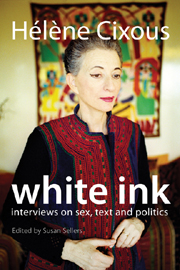Book contents
- Frontmatter
- Contents
- Acknowledgements
- Editor's note
- Preface: On being interviewed
- Part I Writing the enigma
- Part II Writing the feminine
- Part III Writing and politics
- Part IV Writing and theatre
- Part V Writing roots
- Part VI On painting, music and nature
- Part VII Dialogues
- Envoi: But the Earth still turns, and not as badly as all that
- Bibliography of Hélène Cixous's works
- Index
Envoi: But the Earth still turns, and not as badly as all that
- Frontmatter
- Contents
- Acknowledgements
- Editor's note
- Preface: On being interviewed
- Part I Writing the enigma
- Part II Writing the feminine
- Part III Writing and politics
- Part IV Writing and theatre
- Part V Writing roots
- Part VI On painting, music and nature
- Part VII Dialogues
- Envoi: But the Earth still turns, and not as badly as all that
- Bibliography of Hélène Cixous's works
- Index
Summary
This extract is taken from a book of verbal and written interviews with Frédéric-Yves Jeannet, Rencontre terrestre: Arcachon, Roosevelt Island, Paris Montsouris, Manhattan, Cuernavaca (Paris: Galilée, 2005). The exchange is headed “New York, 24 janvier-Paris, 25 janvier 2002” and is given the heading “Mais La Terre tourne, pas si mal”.
f-yj I am emerging from a period of great mourning. This explains my recent silence. Since our last interviews the wheel has continued to turn and here we are, embarked on the second year of this new century that has certainly begun rather badly, despite all the hopes we might have had for it, above all that it might have been different to this century “stitched of camps” which has been the twentieth century as you defined it. What do you say to the present state of the world?
cixous But the Earth still turns — and not as badly as all that — I tell myself, feeling pleased to see once again the print of the planet that you stamp upon your fine pages (where the crossings-out are also beautiful, just like writing), and to find once again your “hand” — I can see, in the sections that cross it out, the text that I'm unable to regard without a pang, the eternal hollow spaces like dog-kennels, and this page, then, which comes to me as a new sign of life, or a sign of new life, is also plunged in commemorative mourning for dogs (all animals are like family to me) and for grandmothers — mine as well, both of mine are evoked, the first scenes where one starts to lose the mother's body.
- Type
- Chapter
- Information
- White InkInterviews on Sex, Text and Politics, pp. 180 - 182Publisher: Acumen PublishingPrint publication year: 2008

